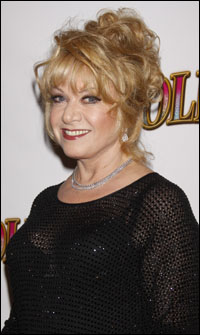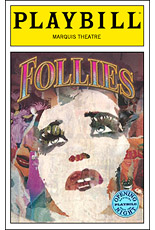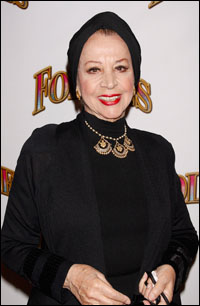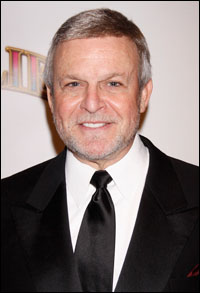
*
Spider-Man got the Broadway season off to a flying start in June and Master Class has already zipped through its whole summer session, but, when Derek McLane's ravishingly tattered curtain was hoisted Sept. 12 at the Marriott Marquis, the floodgates of a new theatrical year seemed to be opening.
What better way to call the season to order than with that majestic Follies of 1971, where graduates of past extravaganzas assemble at the scene of their former glories for their first, and last, reunion the night before the wrecking ball levels their theatre for a parking lot. Stephen Sondheim has, for amusement, invented and then lined up like dominos a spectacular procession of signature showstoppers for the old gang to put across the burned-out footlights, and book writer James Goldman has knotted lots of nasty heartstrings to be untangled and ironed out between songs.
Casually observing the wickedly clever ad for the show, you could get the distinct impression that Follies is "Starring Elaine Paige," in the gilded cameo of Carlotta Campion. Every inch a star and a proven one on Broadway (just a block away as the Norma Desmond of Sunset Boulevard), this "little bit of all right" from London has some tart small-talk and a blazing anthem, "I'm Still Here."
Suspended in space well above her name in that ad is a block of four other worthies, all of their names written in larger type — the principal foursome of actors who do most of the emotional heavy-lifting around the stage. Bernadette Peters is Sally Durant in the 1941 sash, a chorine who married herself a salesman Buddy Plummer (Danny Burstein), while harboring all these years an unrequited love for a banker, Benjamin Stone (Ron Raines). He, however, is wedded — welded, really — to Phyllis Rogers in the 1940 sash (Jan Maxwell). Neither couple wound up with the happy ending they had sung about so ardently in youth, so there are night raids between the two camps all evening long, punctuated by musical pauses for the rest of the cast to strut their stuff.
It being a sentimental journey, characters are eerily accompanied by ghosts of their young selves. The contrast between the idealistic then and the disillusioned now doubles the sorrow — and never so much than with the unhappily married quartet.
| |
 |
|
| Elaine Paige | ||
| photo by Joseph Marzullo/WENN |
Evidently, she counts moments more than lines of dialogue. "A small role, you might say, but it comes with one of the more iconic songs in musical theatre for a woman of my age or older to sing in theatre. I was asked to sing this song and play this role. Since Bernadette was already playing Sally and since I don't think I'd be right casting for Phyllis, it's another opportunity to sing Steve Sondheim. That song is a three-act play. It tells you everything about this woman's life, and it's a social history of America so it's a song that is full to the brim with absolutely everything."
The top-billed Peters earned her place of prominence in the billing because it was her name affixed to the late-spring Kennedy Center contract that permitted this project to move forward. "That's what they tell me," she shrugs modestly. "I'm glad. Aren't you glad? It's such a great show. I wanted to be able to see a show with 41 in the cast and 28 in the orchestra — and a great cast. I love 'em."
Under the direction of Eric Schaeffer and the choreography of Warren Carlyle, the production spent a good five weeks in DC, rehearsing and then performing at the Eisenhower Theater. That was to have been it, but the show's reception, both critical and commercial, pointed the way to Broadway.
Peters, for one, is ecstatic about the transfer, although she's the first to admit Sally weighs a ton on her. "It's an emotionally draining role," she concedes, "but I've learned a lot about myself — and you want that. You pray for a revelation here and there."
[flipbook]
Burstein, who plays her opposite number in that unhappy marriage, is likewise feeling a little frayed around the edges. "It's actually a very, very difficult character. I'm not going to lie. He's a guy in a very special situation. He's been in a loveless marriage for the last 30 years of his life, and, over the course of the show, he has an epiphany. He has to make a decision about what he's going to do. He's going to have to take control of his own life. It's a very, very sad and difficult role to play every single night. I'm sad on stage, and I'm sad offstage — I'm so glad there's 'Buddy's Blues' ['The God-Why-Don't-You-Love-Me Blues'] at the end of the show because it tends to right the ship and put you in a better mood when you walk out the door."
The broad-stroked musical-comedy portions of the role — news to no one who saw his Luther Billis in the recent South Pacific — was effortlessly executed by Burstein. "To me, I'm trying to make it look like non-acting," he says. "I'm trying to be just as real as possible. And I have great examples in Jan Maxwell and Bernadette Peters and Ron Raines. I'm so lucky to be working with them — all, the entire company, in fact."
Raines and Maxwell, well-matched for marital pounding, fight a more sophisticated and subtle but no less more anguishing kind of war. A fairly affable and agreeable chap in real life, Raines took off his gloves for this one and played with the dark. (Having done the musical Night of the Hunter no doubt helped the illusion.)
"I had a great time, and I'm so glad we finally opened. I think we're ready for New York, and I think New York is ready for us. They've been incredibly welcoming."

Buy this Limited Collector's Edition |
"I think she is human," says Maxwell to any who argue otherwise. "It's a very odd script because people keep saying, 'Oh, she's such a bitch.' Not what I'm reading!
"She's a little jaded, of course, and been around the block a few times, but for 30 years she has tried to find something in her marriage to Ben. She's the reason he's successful. She has to throw these dinners and be the wife who gets all these people together and organizes things. She has to be a very open and down-to-earth person, but I think the pain behind that is she's saving a man who can't love himself."
On opening night, she was still one of the dancing wounded. "I have a couple of bad hamstrings. We're trying to make a few changes so I'm not sitting on a pack of ice every night. I do a walk-over at the end, and it's pulling my leg out so I'll have to switch legs or something. Somebody told me musicals are easy. They're not. It's a little bit of a sporting event with the dancing and stuff. I never danced before so I'm trying to pace myself and figure out what my body can do and cannot do."
While marriages try to mend in the wings, Sondheim has supplied a show-tune grab-bag for the various headliners of the evening to step up to the plate and deliver. With brass tacks and italic timing, Jayne Houdyshell puts a Mermanesque spin on her 1930-vintage "Broadway Baby," although she thought she was empty of Ethel. "I thought of a lot of different greats for Hattie — like Sophie Tucker and, of course, Fanny Brice." She replaced Linda Lavin for Broadway, as did Mary Beth Piel for Regine in the role of the French chanteuse, Solange LaFitte. The recasting startled Piel, Yul Brynner's last Anna: "I've never been asked to do a character like her so I find it so ironic to be asked to do her at this age."
| |
 |
|
| Rosalind Elias | ||
| photo by Joseph Marzullo/WENN |
Horowitz was likewise delighted in the star's shadow. "It's like winning the Lottery, getting to sing with Rosalind Elias. The fact that I get to share a stage with her — I just feel so lucky. Our song usually goes over very well, but tonight was particularly special, and I saw her crying, and I started crying. It was a wonderful moment."
Terri White, who hit a homer with "Necessity" in the last Finian's Rainbow, really went to town on Stella Deems' big number, "Who's That Woman?" Says White: "I truly do love that number because tap is my first love. I started when I was three years old, and it just feels so great to be able to do that again — at this age, to still be able to do it. When I start 'Who's That Woman?,' I'm not really sure who that woman is, but, when I finish the number, I feel, 'Yeah, it's me.'"
Broadway's first Kim MacAfee from Bye Bye Birdie and its first Don Lockwood from Singin' in the Rain (Susan Watson and Don Correia) lightly dispatched the dancing duo moment, "Rain on the Roof."
Kirsten Scott, Clifton Samuels, Lora Lee Gayer and Nick Verina are the flashback ghosts — Young Phyllis, Young Ben, Young Sally and Young Buddy — omnipresent in the shadows, poignantly reminding the audience where the four leads came from and what they have turned into.
Verina had some of that wide-eyed wonderment offstage as well. "The first day of rehearsal back in DC, we looked around, and it was Broadway legend after Broadway legend. And they're the nicest people in the world. Nobody had attitude."
Follies, 40.5 years after the fact, provided a happy surprise for Verina at the party in the form of Harvey Evans, who originated the role of Young Buddy.
| |
 |
|
| Ron Raines | ||
| photo by Joseph Marzullo/WENN |
Kurt Peterson and Virginia Sandifur, the original Young Ben and Young Phyllis, were also present and accounted for, glad-handing their contemporary counterparts. (Missing in Action: Marti Rolph, Young Sally, who lives in Florida. This particular Young quartet reunited a few years ago and played the grown-up versions of their original roles in a revival in Ann Arbor.
Victoria Mallory, the first Young Heidi, and Tony winner Dick Latessa, who originated the Major-Domo role when he wasn't covering for Buddy, were in attendance and all-smiles. Mallory went on to the ingénue role of Anne in A Little Night Music, and her daughter, Ramona Mallory, followed her into the party when the show was finally revived 27 years later.
From the previous (2001) Broadway revival of Follies were the Tony-nominated Phyllis and Carlotta, Blythe Danner and Polly Bergen, and from the 2007 Encores! edition was its Young Ben, Colin Donnell, who is now starring as Billy Crocker in Anything Goes, where Follies' first Benjamin Stone is regaling them as Elisha J. Whitney: John McMartin.
Musical-theatre treasures Rebecca Luker and Sandy Duncan were there to cheer on their respective working-husbands, Burstein and Correia, and so was the show's first and foremost orchestrator, Jonathan Tunick.
Barbara Cook, a 2011 Kennedy Center Honoree, finished second for the role of Sally in the original Follies. "Hal [Prince] wouldn't even audition me!" But she has sung Sally's songs to a fare-thee-well ever since. (Famously at Avery Fisher Hall, in the recorded concert version.)
First-nighters with no known Follies affiliation included David Zippel, Emilio and Gloria Estefan, Raul Esparza, Edie Falco, Bryan Batt, Barry Manilow, director Gordon Greenberg, Mary Tyler Moore, Joel Grey and William Ryall from Anything Goes, Nikki M. James, 9 to 5's Megan Hilty, Parker Posey, producer-director Richard Jay-Alexander, Cheyenne Jackson, David Hyde Pierce, John Glover, Elizabeth Stanley, Michael Urie, directors Rob Ashford and Walter Bobbie, Clinton Kelly, Michael Feinstein, Patrick Page and Alexandra Silber.
Last but not least was the original go-fer and eventual Boswell for Follies — Ted Chapin, who chronicled the creation of this masterpiece in his book, "Everything Was Possible: The Birth of the Musical, Follies."
View highlights from the show:





































































































